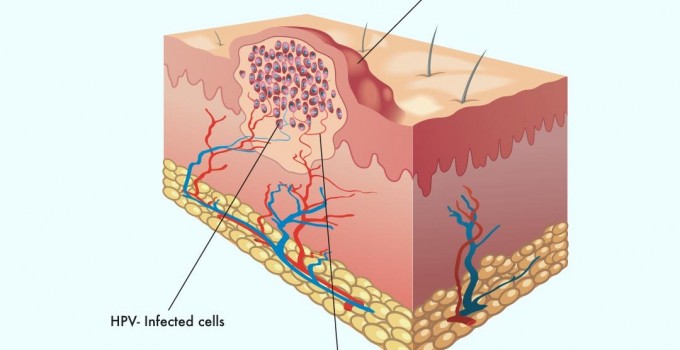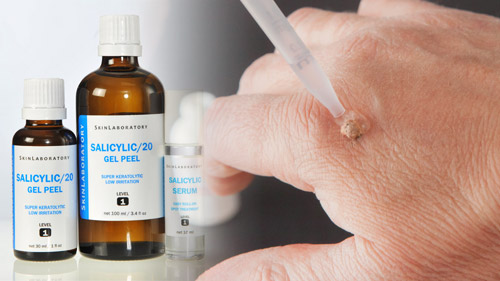Warts: What are They and Why do I Have Them?

Warts are a nuisance. It seems like they pop up for no reason and love to hang around. Their history is quite lengthy too. Warts have been found on 3,000 year old mummy and even attracted the attention of Shakespeare. And while they generally are not considered dangerous, most people consider them embarrassing, ugly and contagious. In some instances they can even be painful.
So where do warts come from? Well, they are caused by the human papillomavirus or HPV. Almost every strain of HPV has the potential to cause harmless warts found on extremities like your hands or feet. However, a few HPV strains contribute to genital warts.
In women, genital warts could possibly lead to cervical cancer. Therefore, in these instances, it’s important to see your doctor for diagnosis and treatment. As for other warts? There are five types. Each occurs on a unique part of the human body and has a distinct appearance.
Five Types of Warts
Common Warts
These generally occur on fingers and toes, but can appear elsewhere as well. Generally, these types of warts will have a grainy, rough appearance with a rounded top. Common warts have a gray color, easily recognizable when compared to surrounding skin.
Plantar Warts
These types of warts are found on the soles of your feet. The unique characteristic of plantar warts are they grow into skin rather than out of it. If you notice a small hole on the sole of your foot surrounded by hardened skin, you more than likely have a plantar wart. Treating them as soon as possible will make walking much more comfortable.
Flat Warts
These types of warts are usually found on your arms, thighs or face. Most of the time, they are missed because they are not noticeable. To recognize flat warts, look for pink, slightly yellow or brownish areas of skin. Then, look to see if the patch of skin has a flat top, as if it’s been scraped. If so, you probably have a flat wart.
Filiform Warts
Areas of concern for filiform warts are the nose, mouth and the neck or underside of the chin. These are sometimes referred to as skin tags because they look like tiny flaps or tags of extra skin. They are the same color as the rest of your skin, but are pretty easy to spot due to their unique tag-like characteristic.
Periungal Warts
Periungal warts are found around or under fingernails and toenails. These can be really painful and affect nail growth. See your doctor as soon as treatment and relief.
Three Wart Reminders
There are a few things to remember in concerning warts. For instance:
They Spread Easy
Warts can be easily spread to other body parts, and are quite contagious. Therefore, if part of your wart treatment involves rubbing with a pumice stone or fingernail file be sure not to use those on any other portion of your body. Also, keep the instruments away from others since using them could cause those individuals to develop warts as well.
Be Cautious if You have Diabetes
If you have diabetes, don’t try to self treat warts on your feet. Instead, see a doctor. Remember, diabetes causes loss of feeling in feet. So treating warts on your feet could actually cause injury without even realizing it.
Avoid Self Removal on Certain Areas
Finally, never try to remove warts on sensitive parts of your body like your genitals, mouth or nose using at-home treatments. It’s best to see a doctor for these instances as home treatments may lead to unsightly scarring, or worse, recurrence.
What About Prescription Medicine?
 Prescription medication treatments are quite effective.Over-the-counter treatments work too, however, they could take weeks or months before results are noticeable. And, there is always potential for the wart to return. After all, it is a fungus and in order to remove the condition the fungus must be removed.
Prescription medication treatments are quite effective.Over-the-counter treatments work too, however, they could take weeks or months before results are noticeable. And, there is always potential for the wart to return. After all, it is a fungus and in order to remove the condition the fungus must be removed.
However, with prescription medication you can rest assured your warts will die. Therefore, having your doctor examine the wart to identify type and severity positions them to prescribe the best medication (ointment, cream or pill) for your situation. If you have questions about your prescription, or would like your prescription filled, IPS compounding can help. Contact us today and let us know how we can be of assistance. We will work to answer all of your questions and concerns.
If you are still curious about warts and wart treatment, be sure to read our second post on the topic. It’s insightful and quite helpful. Our goal is to arm you with the information you need to make confident choices regarding your health. Warts can be unsightly and painful, but you don’t have to live with them. IPS Compounding can help.

